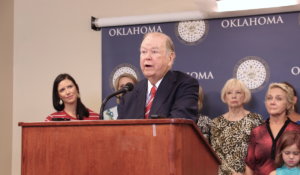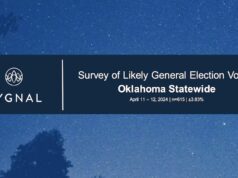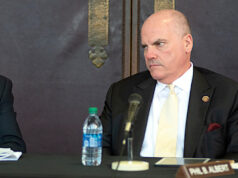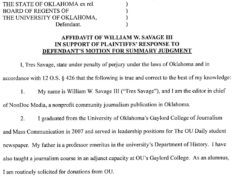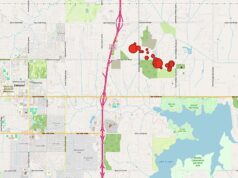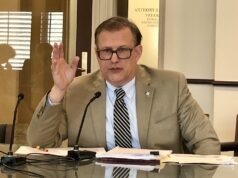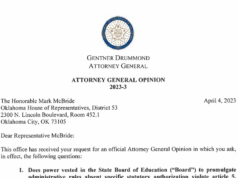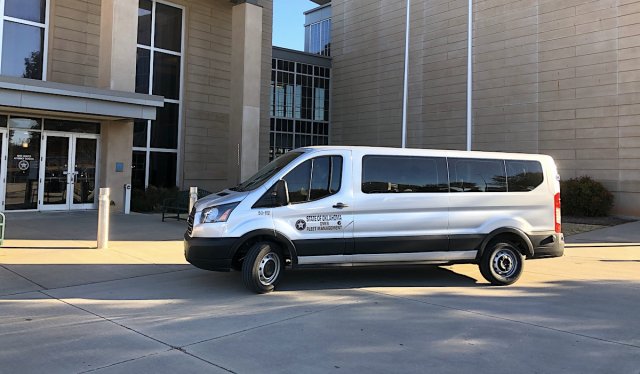
Oklahoma’s latest multi-county grand jury is scheduled to convene today. State and district attorneys use the multi-county grand jury to investigate and bring indictments in complicated criminal cases.
As he did for the state’s last multi-county grand jury, Oklahoma District Court Judge Timothy Henderson will be presiding.
The subject matters that a multi-county grand jury may investigate are established by 22 O.S. Section 353 of state statute. They include:
- Murder
- Rape
- Bribery
- Extortion
- Arson
- Perjury
- Fraud
- Embezzlement
- Drug crimes
- Organized crime
- Public corruption
- Securities violations
- Government purchases
- Misappropriation of public funds
A multi-county grand jury has subpoena power to compel witnesses to appear and provide testimony under oath or produce documents and other evidence.
The grand jury typically meets for up to three consecutive days each month with a full term lasting 18 months, though it can be extended six additional months if necessary. Oklahoma’s last multi-county grand jury adjourned in November, more than five months before its statutory deadline. It released an eight-page report of activities, which included 13 sessions, 1,093 subpoenas and 18 indictments charging 20 people.
Pat Ryan special prosecutor for Boren, Hall matter
RELATED
David Boren, Tripp Hall remain under OSBI investigation by Tres Savage
Oklahoma’s 18th multi-county grand jury will ultimately be presented information about a number of potentially high-profile cases.
With the Oklahoma State Bureau of Investigation looking into allegations of sexual and financial misconduct against former U.S. Sen., Gov. and OU President David Boren, a special prosecutor appointed by Attorney General Mike Hunter could ask the grand jury to subpoena witnesses, subpoena records or issue indictments in the case.
That prosecutor, Pat Ryan, could present information on behalf of OSBI, which is also investigating longtime Boren employee and former OU Vice President of University Development Tripp Hall.
Primarily through attorney Clark Brewster, both Boren and Hall have maintained their innocence. If OSBI asks Ryan to present information to the multi-county grand jury, the state’s inquiries into the two men could be extended or wound down.
While Hunter specified in April 2019 that Ryan has access to the multi-county grand jury in performance of his duties overseeing the Boren and Hall investigations, Ryan is under no obligation to use the grand jury in determining whether to pursue charges.
Additional multi-county grand jury details
In its final report from November, Oklahoma’s previous multi-county grand jury outlined the body’s value to law enforcement:
By obtaining testimony, the respective district attorneys and local law enforcement agencies were able to eliminate individuals as potential suspects, strengthen their investigations, make charging decisions and/or further pursue leads resulting from testimony.
That grand jury — Oklahoma’s 17th multi-county grand jury — also explained its investigatory tactics and purposes in the report:
Always mindful of the protections afforded individuals under the Constitution of the United States and Constitution of the State of Oklahoma, it is clear the power to subpoena documents, records, and other evidence, and compel the attendance and testimony of witnesses under oath across county boundaries is an extremely effective tool in the investigation of criminal activity occurring in single or multiple counties across Oklahoma. The power to compel testimony has enabled the Oklahoma Multicounty Grand Jury to obtain the testimony of witnesses whose vital information would likely not have been obtained by other processes.
Likewise, the authority to subpoena different types of financial, business, and phone records has been pivotal in discovering and documenting criminal activity throughout the state without prematurely alerting those under investigation and giving them the opportunity to dispose of evidence, change their method of operation, or otherwise hinder lawful investigations.
The grand jury process serves an important function in the protection of a free citizenry in a representative republic such as ours. The Oklahoma Multicounty Grand Jury is composed of ordinary citizens from across our State. We do not decide guilt or innocence, but rather, determine whether there is sufficient evidence which, if explained or uncontradicted and presented in court to a jury of one’s peers, would prove the defendant’s guilt beyond a reasonable doubt. When there is sufficient evidence of both type and quality, the grand jury’s responsibility is to bring an indictment, or accusation of a crime, so that the state may require the indicted to face his accusers and stand trial.
State statute directs the work of the grand jury to be kept secret, except when ordered by the court. The law does permit witnesses to publicize their testimony if they choose, unless the presiding judge orders otherwise.
Witnesses who appear before the grand jury can have a lawyer present to advise them, but the lawyer cannot object to grand jury questions or make arguments to the grand jury.
A representative of the Attorney General’s Office presents evidence to the grand jury and questions witnesses. If the grand jury issues an indictment, the defendant is prosecuted in the district court where the indictment is filed.
Multi-county grand jurors are selected from jury lists statewide. They are paid $20 per day, plus reimbursement for meals and mileage.










